|
|
|
Sort Order |
|
|
|
Items / Page
|
|
|
|
|
|
|
| Srl | Item |
| 1 |
ID:
177954
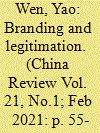

|
|
|
|
|
| Summary/Abstract |
Amid the COVID-19 pandemic, how does the Chinese Communist Party (CCP) attempt to project a positive image both at home and abroad? This article examines China’s party diplomacy—the CCP’s interactions with foreign political parties and organizations as an international actor per se—that is managed by the CCP’s International Department (IDCPC). Mirroring China’s domestic situation, party diplomacy during the pandemic has gone through three stages: “outbreak,” “giving back,” and “new normal.” Party diplomacy is primarily aimed at branding the CCP as a capable and responsible ruling party. The case of a joint open letter initiated by the CCP suggests that party diplomacy has succeeded in soliciting positive responses from some of its foreign counterparts. Moreover, the IDCPC has been increasingly paying attention to China’s domestic audience. Through packaging positive remarks by foreign political elites into domestic propaganda, the IDCPC seeks to not only exhibit the Party’s international prestige and legitimize its rule, but also showcase the department’s own competence. Taken together, the IDCPC emerges as an integrated propaganda vehicle, a hub of favorable information, that links the CCP’s international liaison with domestic legitimation.
|
|
|
|
|
|
|
|
|
|
|
|
|
|
|
|
| 2 |
ID:
177956


|
|
|
|
|
| Summary/Abstract |
This study examines whether nonstate actors can enhance social resilience to cope with extreme events by examining and comparing civil society’s responses to COVID-19 in China, Japan, and South Korea. The research has found that the civil society sector in each of these three countries played essential roles in combating the pandemic, either by reinforcing government-led efforts or by filling the institutional voids left by the government. Civil society actors in these countries have contributed to social resilience by donating money and medical supplies, providing imperative social services, disseminating needed information, and advocating for marginalized groups in society. This study provides timely information on how resources were mobilized by civil society to respond to COVID-19. Additionally, it shows how institutions in different countries have shaped civil society actors’ distinctive actions in the fight against COVID-19.
|
|
|
|
|
|
|
|
|
|
|
|
|
|
|
|
| 3 |
ID:
177955
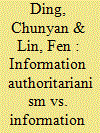

|
|
|
|
|
| Summary/Abstract |
Mainland China and Hong Kong are two jurisdictions that, on the one hand, have sharply distinctive information ecosystems despite being one country and, on the other hand, are closely connected with each other in terms of the COVID-19 outbreak and related anti-pandemic measures. This note, through a comparative lens, outlines and compares how the information ecosystem of Mainland China and Hong Kong functioned during the early stage of the outbreak, that is, from 31 December 2019 to 29 February 2020. By tracing and examining the timeline of events and news articles published during the early stage of the outbreak through Wisers Information Database, it demonstrates and conceptualizes the information governance in Mainland China as “information authoritarianism” and that in Hong Kong as “information anarchy.” However, despite different patterns of information governance rooted in the different sociopolitical settings, both information ecosystems suffered from false pandemic information.
|
|
|
|
|
|
|
|
|
|
|
|
|
|
|
|
| 4 |
ID:
177957
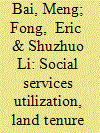

|
|
|
|
|
| Summary/Abstract |
This article explores whether the government policies are related to migrants taking on new self-identity. Drawing from the literature on identity, migrant adaptation, and citizenship, we propose a conceptual model of self-identity by rural migrants in China. We argue that self-identity of rural migrants is related to social policies that discourage a sojourner mentality and allow rural migrants to enjoy the same set of social benefits as local residents. Based on data collected in Xi’an in 2012, our findings support the argument. The findings have two important implications. First, our research shows that the simple dichotomy of rural versus urban in the literature regarding migrant workers in China may not be appropriate anymore, as a considerable proportion of migrant workers in China no longer identify themselves as rural residents and not urban residents. They identify themselves as “urban population from elsewhere” (chengshi wailai renkou). Second, our study opens a new venue for understanding self-identity of migrants. We offer an understanding of how social policies are related to self-identity.
|
|
|
|
|
|
|
|
|
|
|
|
|
|
|
|
| 5 |
ID:
177951


|
|
|
| 6 |
ID:
177959


|
|
|
|
|
| Summary/Abstract |
The state plays a vital role in shaping the values and beliefs of ordinary citizens in the realm of civic education. Since the early 1980s, the significant political changes associated with decolonization and retro-cession have transformed the landscape of civic education. Differences over a shared sense of citizenship, and how this should be represented in education, have been prominent in discussions of the Hong Kong community over the years. The task of community civic education in Hong Kong largely rests with the Home Affairs Bureau and its advisory body, CPCE—a committee established in 1986 for advices and implementing activities outside schools in conjunction with the Government and concerned community organizations. However, the Government has attempted to manipulate and steer the Committee’s work through its terms of reference, its organizational restructuring, its activities, its funding support, and the appointment of members. As a result, the Committee has been constrained by its composition, powers, and functions, and these have impaired its role as an advocate for civic education. This article ends with a discussion of the conditions, constraints, and strategies of the state in exercising hegemony.
|
|
|
|
|
|
|
|
|
|
|
|
|
|
|
|
| 7 |
ID:
177958
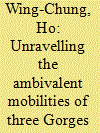

|
|
|
|
|
| Summary/Abstract |
The Three Gorges Dam project (1994–2009) in Chongqing of China created 1.35 million forced migrants. As the region next to the reservoir could not accept all the displaced, 96,000 were relocated to 11 provinces/cities. Among these “out-bound” (waiqian) migrants, 9,007 were moved 2,300 kilometers away to coastal Guangdong from 2000 to 2004. Through soliciting testimonies from 32 young-adult “dam migrants” (currently aged 18–39) in Guangdong, this article identifies a commonly shared ambivalence over the meaning of displacement such that the informants—after more than a decade of resettlement—still maintain different degrees of feeling as both a stranger and a local, as both a Guangdonger (Guangdong ren) and a Chongqinger (Chongqing ren), and as both a sojourner and a dweller. It is argued that they possess more complex movement imaginaries than older, first-generation migrants, and experience a more complex mode of marginalization. The political implications of the ambivalently mobile population are discussed as its existence echoes the emerging governmentality scholarship on the migrant experience.
|
|
|
|
|
|
|
|
|
|
|
|
|
|
|
|
| 8 |
ID:
177952
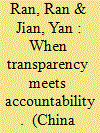

|
|
|
|
|
| Summary/Abstract |
Existing studies of Chinese officials’ blame avoidance behavior argue that Chinese officials’ motivation for blame avoidance comes from top-down performance evaluation and responsibility attribution pressures and Chinese officials tend to deflect the blame downward to lower levels. Nevertheless, at the early stage of the COVID-19 outbreak in Wuhan, local officials made the unusual move of deflecting blame upward onto the central level and both central and local actors became embroiled in a blame game that took place against the backdrop of recent recentralization drive. To better explain this puzzle, this article examines how bottom-up public demands for transparency as well as top-down responsibility attribution pressures together shape the motivations, strategies, and interactions of central and local officials in this blame game. Our research shows that the public appeals for transparency stoked the top-down responsibility attribution pressure, further reinforcing local officials as well as the center’s motivation to avoid blame at the early stage of the COVID-19 outbreak in Wuhan. Local officials and central public health technocrats engaged in a blame game that played out in various media outlets. To insulate itself from public criticism and prevent the blame game from getting out of hand, the center ultimately responded by moving to hold local officials accountable through its propaganda and cadre disciplining apparatus.
|
|
|
|
|
|
|
|
|
|
|
|
|
|
|
|
| 9 |
ID:
177953


|
|
|
|
|
| Summary/Abstract |
When COVID-19 broke out, local governments in China were expected to deal with the pandemic efficiently and effectively due to their rich experience in tackling the SARS in 2003. However, provincial governments have taken divergent measures in the fight against COVID-19. This research note disentangles the differences and similarities in virus containment policies based on a five-dimensional framework, namely starting early preparation, activation of first-level response, disclosure of epidemic information, resumption of work and production, and utilization of digital tools. Our analysis demonstrates that the government responses are uneven and that there are indeed front-runners in handling the COVID-19 pandemic. Building upon exiting theories on local government behaviors, we suggest that “conformity tendency” in policy diffusion might be helpful to explain the varied responses. During public emergencies, while any provincial government can take the initiative in a particular policy dimension, others need to quickly handle peer pressure or take the political risk of being left behind. Gradually, local governments tend to accept and adopt similar responses and strategies in the national epidemic.
|
|
|
|
|
|
|
|
|
|
|
|
|
|
|
|
|
|
|
|
|